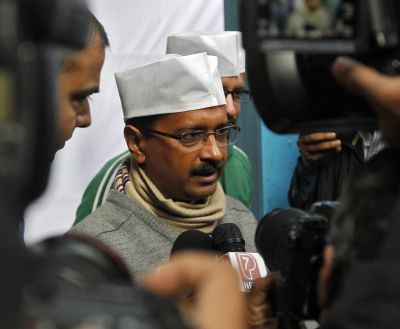 But by picking on Kejriwal for his threats, unfortunate as they are, and ignoring the appreciation he gets is missing the woods for the trees. Hopefully, the media would introspect and infuse more vigour, not mere hype, in democratic debates, says Mahesh Vijapurkar.
But by picking on Kejriwal for his threats, unfortunate as they are, and ignoring the appreciation he gets is missing the woods for the trees. Hopefully, the media would introspect and infuse more vigour, not mere hype, in democratic debates, says Mahesh Vijapurkar.
It can be argued that objectivity is impossible in journalism. The choice of the subject, the people a reporter talks to about it for information, their sequencing, and which part of it all is highlighted are all subjective decisions. Then where it is placed in a newspaper or when it is played on the television. Any decent J-school would tell the students that.
But fairness is not impossible. In fact, it is easier to achieve by trying to provide all sides as possible, without hype. Plain stating of the main points without the breathlessness seen in writings and telecasts which is endemic these days helps not only people figuring in the output but the newspaper readers as well as television audiences.
Fairness by the media includes the ability to take criticism on the chin and if required, correct the ways, because in the absence of objectivity, and even fairness, bias steps in. Bias is more dangerous than absence of objectivity and fairness. And the presumption that the media cannot be told about flaws they have is way off logic, especially in a democracy.
The News Broadcasters Association’s threat that the organisation can “reconsider coverage of activities of the Aam Aadmi Party” is perhaps the worst manifestation of institutional arrogance and contradicting all claims of objectivity. It cannot be claiming to be objective and yet issue such a notice to a party which is a serious player in the current elections.
By ‘serious player’, I mean a party which may or may not win many or any seats to the Lok Sabha but is infusing a new political culture into the country. It may be over-ambitious, it may even be foolhardy, but certainly a welcome enterprise. It goes far beyond the NOTA option the Election Commission has introduced from this election.
If it had not been serious, Delhi wouldn’t have seen as many AAP MLAs as it has to start and run a minority government for 49 days. It has shocked the legacy parties enough in ways ‘you cannot imagine’, to borrow from Rahul Gandhi. Also, it may not have led to the so-called primaries of the Congress to pick candidates, and chats over tea by the Bharatiya Janata Party.
A boycott, should it transpire, and hopefully wouldn’t ever, can queer the pitch for an underdog fighting the mighty. The AAP has issues of finding funds to the levels which are permissible by the Election Commission to be spent. It cannot advertise -- like United Progressive Alliance-II did prior to poll dates announcement. Notwithstanding the disadvantages, it has to reach the voters. Blacking them out would be absurd.
Manohar Parrikar was recently blasted for saying, “They (journalists) write news as they understand it” though he had put the finger on the nub. Television sees reporters asking leading questions which can when repeated help create a distorted view. Like announcing ‘vandalism’ when crush of bodies toppled metal detectors, like asking commuters not what they thought of it but if they had been inconvenienced.
What was a shocker was television channels playing the video clip of Arvind Kejriwal’s threat to the media at the Nagpur fundraiser, repeatedly but ignoring the fact that those he was talking to were applauding him for it. The item was less news but from the word go, it was not a report but an editorial: venting outrage mixed with the fact of the incident. Comment got mixed up with fact.
This applause was not unique to the Nagpur gathering but has been so at his public meetings as well. On two news television channels, where I had participated, the anchors’ attention had to be drawn to this fact. In one case, the anchor appeared stupefied. For the media which digs mountains out of molehills, this shocker should have been evident without a prompting.
The Editors Guild of India saw "an intolerant mindset" and which was “violating the norms of decent democratic debate” but fortunately did not hold out a blackout threat. The broadcasters, on the other hand, threatened what could have derailed a democratic debate. The two bodies, as much as the public, are aware of the ‘paid news’ phenomenon.
The extent of damage ‘paid news’ and control on output because of ownership of media can do has to be assessed but prior to that, the extent of the mischief itself has to be quantified. Kejriwal could have complained, needn’t have threatened jail. However, when the public claps for him on such occasions, they are simultaneously jeering at the media. It also shows the suspicion they have of newspapers and television stations.
But by picking on Kejriwal for his threats, unfortunate as they are, and ignoring the appreciation he gets is missing the woods for the trees. That the media should have a mote in the eye is the saddest part. Hopefully, the media would introspect and infuse more vigour, not mere hype, in democratic debates.











 © 2025
© 2025